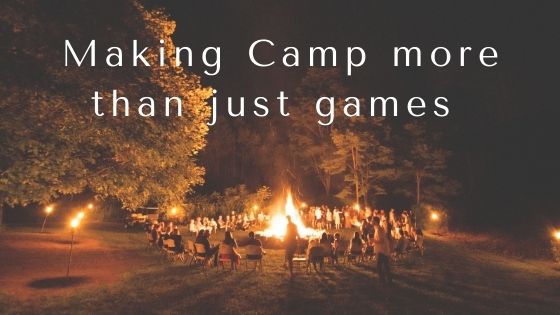How to Make Camp More Than Just Games
Written by Nate Smith
How do you make camp about more than just games? Develop and cultivate the right camp culture. Why do kids want to go to camp? Why do parents want to send their kids to camp? These are two great questions with drastically different answers. Camps are rightly asking these two questions and evaluating the answers to implement solutions and improve their programs. Before seeking the answers to those two questions, a better question to consider would be: Why camp? When you answer “Why camp?” you are forced to honestly evaluate what is important. Program directors who want to make camp more than just games will do these five things to develop and cultivate the right camp culture:
- Know the camp’s history.
- Seek to understand its traditions.
- Find a balance that celebrates tradition and pursues innovation.
- Know and agree with the camp’s mission statement.
- Make glorifying God your main priority.
Whether your camp is 100 years old or 10 years old, it has a history. A program director will learn as much as possible about the camp’s history, founders, charter staff, and public relations throughout the years, from its shining moments to its shameful moments. A camp’s culture is typically defined by its history and traditions. Therefore, it is important to know those things because of the effects they collectively have on the camp’s identity. A camp’s culture is directly linked to its identity and can have positive or negative effects. Program directors must recognize these realities while feeling the weight of maintaining the right identity.
Knowing your camp’s history will definitely help in understanding its traditions. In the musical Fiddler on the Roof, the lead character Tevye opens with a song called “Tradition” (now it’s stuck in my head). After the first chorus he says, “Because of our traditions, we’ve kept our balance for many, many years.” Then Tevye closes the song by saying, “Without our traditions, our lives would be as shaky as…as… as a fiddler on the ROOF!” Many camps view their own traditions the same way as Tevye does in Fiddler on the Roof. Traditions are very important and play a powerful role in making up your camp’s identity. New staff members, especially program directors, should avoid speaking disparagingly towards the camp traditions. Seeking to understand your camp’s traditions will help ensure the right culture is being developed and cultivated.
Program directors who find the balance between celebrating tradition and pursuing innovation will find the key to developing and cultivating the right camp culture. The balance of celebrating tradition and pursuing innovation is a rare dynamic that isn’t acquired overnight. Program directors often fall into one of two traps. Either they hold so tightly to celebrating traditions that innovation is looked at as a threat, therefore nothing ever can or will change. Or they fall into the other trap of only pursuing innovation, which can jeopardize the camp’s identity and create an “us vs. them” mentality. Neither of those approaches alone will ever produce the right camp culture. If finding balance is so important and not acquired overnight, where and how does a program director start the process of finding that balance? A good place to start is by evaluating camp traditions and programs. Evaluation is a crucial part of understanding the traditions and worthiness of programs. By what standard are these traditions and programs evaluated?
Having a mission statement is imperative to evaluating every aspect of your camp. Mission statements are powerful tools that ensure the right camp culture is being developed and cultivated. Not having or knowing your mission statement is like being on a ship lost at sea. The mission statement will help steer and anchor the camp. Even more important than having a mission statement, the program director must agree and believe in that statement completely. The mission statement is what everything should flow from; it is the lens by which you see everything. Making decisions on what programs and traditions to keep and how to do them becomes clearer when filtered through the mission statement. The programs and traditions that are not helping you accomplish your mission are the ones you would want to consider eliminating. Spending precious resources like time, money, and efforts on programs that do not help accomplish the mission will destroy the staff, culture, and identity of the camp.
If you’ve made it to this point, congratulations! You are definitely a “camp” person who probably LOVES camp ministry. Camp ministry is a special tool that God can use to really impact the lives of many people. As a program director the absolute most important thing you can do to develop and cultivate the right camp culture is to make glorifying God your main priority. How does a Program Director accomplish glorifying God as the main priority? First, read God’s Word. There is no substitute or supplement for God’s Word. More important than just reading God’s Word would be understanding, believing, and obeying what you read in His Word. Secondly, another way to glorify God is by associating with a local church where the regular and faithful preaching of God’s Word is accomplished. God’s plan for redeeming humanity is accomplished through the local church, and camps are tools that should help that mission succeed. There is no substitute or supplement for what the local church provides in accountability, encouragement, and equipping for believers. Lastly, use your God-given abilities and gifts to make Him known through the ministry to which He has called you.
Written by Nate Smith who serves as the Program Director at Camp Victory. To learn more about Camp Victory, their ministry and summer camp opportunities visit their website. [https://www.campvictoryal.org]
Views: 211



Got something to say?